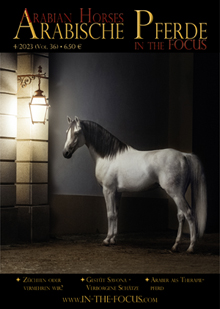Hardly a day goes by without hearing about a few pitiable foals or yearlings who are somewhere at the butcher and have to be sold until the day after tomorrow, otherwise, they will become sausage. And yes, there is also a whole range of Arabian horses among them, from different sources, some with very good pedigree, with and without papers. But how did this development come about?
Root Cause Analysis
For one thing, there are still too many Arabian foals looking for a new owner, despite the drastically reduced (!) number of foals in Germany. This is, among other reasons, because Arabian horse breeders missed out on the leisure rider market, which was ignored by the breed associations, and which instead focused on other “special horse breeds”. On the other hand, it is due to the increasing specialization in the Arabian breed, because a show horse, whose “type” is not quite good enough, has difficulty to succeed in other areas (distance, leisure time, sports, racing), as it is hardly suitable for them either. As a third reason you have to name the breeders who breed “horses in big numbers”, in the hope that of 100 foals there will be a top product, nine may meet the standards, and the remaining 90 foals are thrown for cheap money “on the market!”. Additionally, as if there are wouldn’t be enough foals offered for ridiculously low prices born in Europe, youngsters from the studs in the Arab countries are coming to us through dealers. Just to name a few numbers: Meanwhile, half of all Arabian purebred foals are born in the countries of the Middle East every year. In Saudi Arabia, there are nearly as many foals as in the US (2016 figures), over 3,000! This raises the question: Where do all these horses go?
Let’s face it: Foals that are going to the butcher because they do not live up to expectations, and after weaning “just take up space and incur costs” is not a new phenomenon. That has always existed, albeit to my mind not to the extent and not as cross-border as today. What’s new, however, is the way some butchers or dealers try to get these young horses to the man – or rather to the woman – because most buyers are (young) women, where the pity scam promises the most success. There, the deplorable creatures are offered on social media, in groups specially created for this purpose by the butcher / dealer (or his accomplices). If you now consider that the slaughter value of a foal / yearling is only 150-500 €, but the horses are offered for 1000-1500 €, you can quickly calculate the profit margin. With the pity scam (either sold until tomorrow or slaughtered) the length of stay in operation is short and inexpensive. According to the NDR TV-program “Abzocke mit Pferderettung” (“Rip off with saving horses”), between October 2017 and March 2018 in the Facebook group “We save together – mediation of horses in need”, horses worth over 300,000 euros were offered and most of them sold. Not a bad business.
What the potential buyers do not know, many a horse is bought with strangles or other diseases that break out in their native stable and then may cause a multiple of the purchase price of veterinary costs, which then again exceeds the financial means of (mostly) young buyers. The misfortune takes its course.
Who is guilty?
But where can one begin to end the misery – or at least reduce it? First and foremost, the breeders are to be taken to the duty. They have the moral responsibility for the foals they breed, and they have to make the effort to find a suitable place for them. This is easier said than done when the stables are full – but then you just cannot continue breeding. And if it really should be unavoidable that you bring a horse to the butcher, then you have the duty again, to ensure that the animal is actually killed, and cannot be resold. Because quite often, the dealer or butcher is not the last stop of a horse but only the beginning of a path of suffering.
Also, the breeding associations need to be taken to the duty. Because it is the serious breeders who – in addition to the slaughter horses – suffer from these machinations. Breed societies live from breeding and breeders – and should therefore also promote the market, not only for the high-end products but also for the vast majority of “normal” horses. As we have already mentioned, in Arab horse breeding great omissions have been made in the past and even today I see no real initiatives here. The aim is to make the breed of the Arabian horse “acceptable” among leisure riders. But this can not be achieved through shows or breed-own breeding events, but only in comparison with other breeds, be it on endurance rides, at fairs, tournaments, or specially created events such as the “Day of the Arabian horse in Bavaria” or the “Day of the Arabian Horse “in Marbach, where the Arabian horse is presented in all its versatility. Here comes the “general horse audience” and can get an impression of the beauty, the great character, the riding ability of an Arabian horse. In this regard, the marketing mechanisms must be stirred, be it with events, advertisements, flyer, etc.
No solution
Also, of course, the traders / butchers need to be taken to the duty who have developed this perverted pity scam and practice it. It might be true that they only pursue their “profession”, and not least write the aspect of animal welfare on their flags (according to the motto: “we only ensure that the poor animals are not slaughtered”), however, the pity scam with threatening that the animals will be slaughtered tomorrow if they are not sold is highly dubious.
And last but not least, anyone who thinks about buying a horse should not rush to do so, but should carefully analyze their financial means of purchase and maintenance. Yes, it is sometimes difficult to see that a young Arab is standing at the butcher and you could save him. But you can not help all the animals in this world. Even the argument “one can not save the world with this one purchase, but at least this one animal can be saved” is correct. But at the same time, you also help a “business idea”, a system that is deeply despicable. And with each horse sold over the pity scam two more follow. Meanwhile, the horses even arrive from the Arab countries at the dealers in Europe. There is no shortage of supplies.
Gudrun Waiditschka












